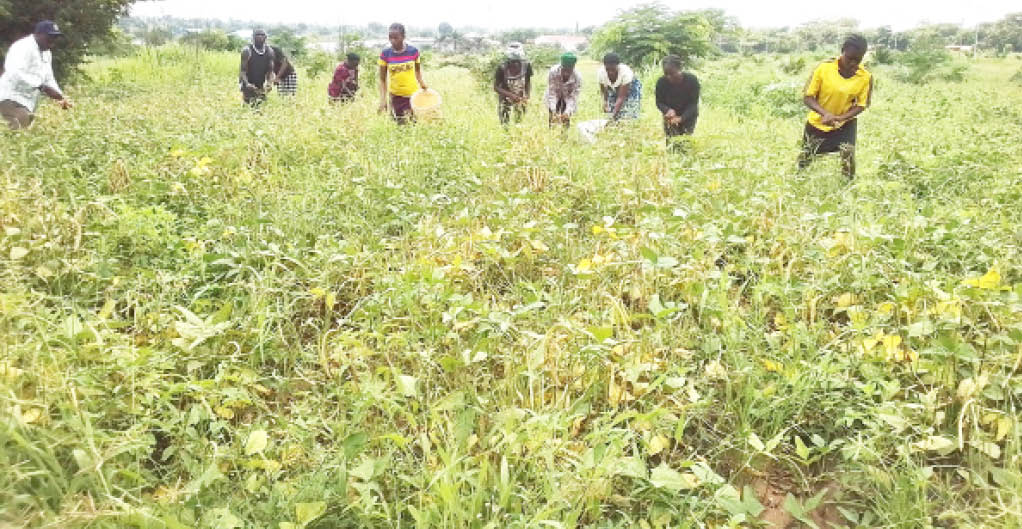Strategic support for farmers for economic stability, affordable food
In periods of economic unpredictability, it is essential to develop strategies that are advantageous for both agricultural producers and consumers, especially those from economically disadvantaged communities, whilst safeguarding the lasting sustainability of the agricultural sector. Rather than depending on temporary price reductions, a more integrated strategy that tackles the underlying issues facing agriculture is necessary. […]

farmers picking cowpea in one of the farms
In periods of economic unpredictability, it is essential to develop strategies that are advantageous for both agricultural producers and consumers, especially those from economically disadvantaged communities, whilst safeguarding the lasting sustainability of the agricultural sector.
Rather than depending on temporary price reductions, a more integrated strategy that tackles the underlying issues facing agriculture is necessary. This approach ought to concentrate on minimising production expenses, stabilising food prices, reducing fuel costs, and bolstering the national currency to promote economic stability and ensure food security.
A significant obstacle for farmers is the escalating cost of essential inputs, including fertilisers, pesticides, and labour, which can hinder their effectiveness and output. Government intervention through subsidies or the encouragement of cost-effective technologies, such as mechanisation, can alleviate these financial burdens, enhance profitability, and foster sustainable agricultural practices.
By providing this kind of support, the government can assist in increasing crop yields and safeguarding farmers against market fluctuations.
Establishing policies that stabilise prices is equally vital for preserving the livelihood of farmers. Rather than instituting price caps that may detract from farmers’ earnings, implementing minimum price guarantees or providing subsidies will ensure that they receive a fair and consistent income. Moreover, directly linking farmers with consumers via digital platforms or cooperatives can lessen dependency on middlemen, improve market accessibility, and help maintain reasonable food prices for the public.
The burden of fuel expenses also significantly impacts farmers, especially regarding transportation and machinery. Reducing fuel prices would lower overall production costs, benefiting consumers by keeping food prices more manageable. Strengthening the national currency could further help in decreasing the costs of imported agricultural inputs, like machinery and chemicals, which would enhance farmers’ productivity and their competitive edge in the international market.
Investing in sustainable agricultural methodologies is crucial for continued development. The government should promote practices such as agroecology, crop rotation, and organic farming, which not only lower input costs but also boost soil health and resilience against climate change. Diversifying crops will further diminish farmers’ dependence on a singular commodity, making them more adaptable to shifting market demands and climatic circumstances.
Enhancing rural infrastructure, including roads, storage facilities, and irrigation systems, is vital for reducing production costs and improving market connectivity. Investment in these areas would invigorate rural economies, generate employment opportunities, and bolster food security.
Additionally, food subsidy initiatives aimed at vulnerable populations would help guarantee that even the most impoverished families can access basic necessities, thus alleviating food insecurity and social unrest.
Promoting investment in agriculture is crucial for the modernisation of the sector. A stable and lucrative agricultural ecosystem attracts both domestic and international investments in technology, infrastructure, and innovation. Such investments can enhance farming practices, increase productivity, and fortify the entire agricultural supply chain against economic shocks.
Sadly, corruption within Nigeria’s agricultural subsidy initiatives has exacerbated these challenges. Funds intended for agricultural support, such as fertilisers and seeds, are often misappropriated by corrupt officials or intermediaries, preventing aid from reaching its intended farmers.
In certain instances, fraudulent beneficiary lists are produced, with bribes solicited to obtain subsidies, further marginalising those in need. The lack of effective monitoring and oversight permits such practices to persist unchecked, intensifying inequality.
As a result, many deserving farmers are deprived of necessary assistance, contributing to worsening poverty in rural areas. Corruption further generates inefficiencies that hinder agricultural advancement, undermining food security and eroding trust in government initiatives.
The introduction of transparent systems, digital platforms, and enhanced oversight could help curtail corruption and ensure that subsidies are delivered to those who genuinely require them.
In summary, a long-term, well-rounded strategy that addresses the economic difficulties encountered by both farmers and consumers is vital. By reducing input costs, improving market access, supporting sustainable agricultural practices, and investing in rural infrastructure, the government can cultivate a more stable and thriving agricultural sector.
These initiatives will not only favour farmers but will also help ensure that food remains within reach for consumers, particularly those from lower-income demographics, thereby contributing to a stronger and more resilient economy and society as a whole.
Ahmad Shuaibu Isa
